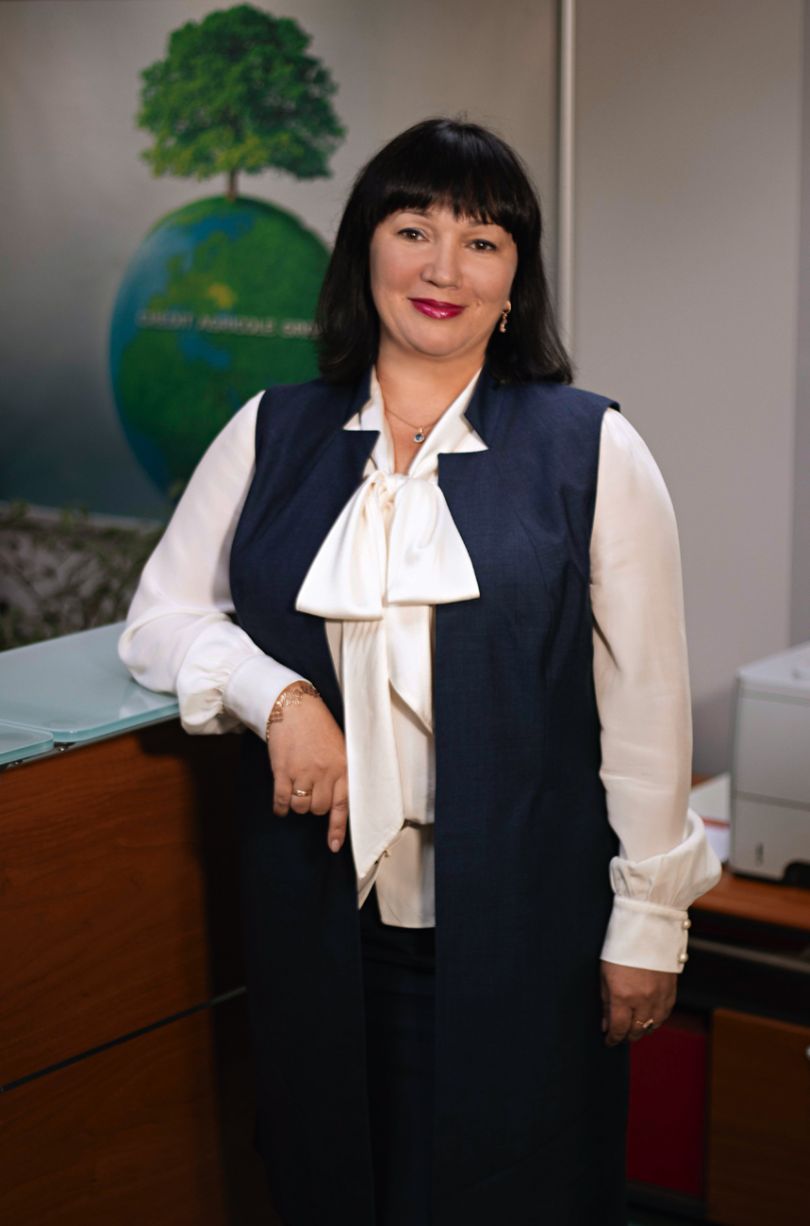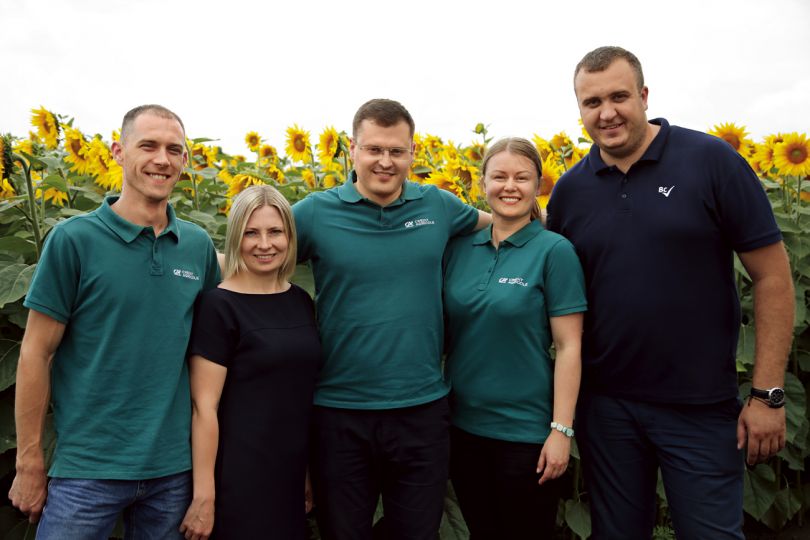
Year to year, the demand in agrofinance for working capital and investment projects grow in Ukraine. The share of agrarian financing portfolio in the overall banking finance reached 8%. Credit Agricole – a foreign bank present in Ukraine for more than a quarter of a century – pays special attention to cooperation with agrarian companies in Ukrainian financial area.
– Several months ago, Credit Agricole Bank announced a new development strategy until 2022. What is special about it? What are the focus areas?
Indeed, in June Credit Agricole Group presented a new Group Project that sets strategic objectives to be implemented by 2022. The peculiarity of the document is that it defines the purpose of Credit Agricole: “Working every day in the interest of our customers and society”. It is important that the focus of Credit Agricole on agrarian sector remains unchanged: we keep on prioritizing cooperation with the entire agribusiness ecosystem. Other priorities include partnership with multinational companies, supporting and developing innovative projects, enhancement of customer service, improvement of working conditions for our team and implementation of corporate social responsibility projects.
– Will your approach to serving agrarian companies change?
Only in terms of service improvement. Few years ago, we defined the support to all segments of agribusiness in Ukraine – from small producers and farms to agro holdings that also sell agricultural products in the international markets – as our strategic objective and we are not going to change the vector. Today, we provide assistance to companies in the area of crop protection agents and mineral fertilizers import, agrarian products export, agricultural production and farming.
– Which companies can become customers of your bank? What factors do you consider when reviewing applications for financing businesses and projects?
First, for us it is important to understand the business of our customer: to know that the company is transparent and is ready to be honest and open with the bank. We also take into account the reputation of the company and its relations with partners. Making a decision on financing and cooperation with the company, we take into consideration not only the financial analysis indicators that demonstrate the ability of the company to generate cash flows, but also the level of operational management: implementation of new technologies, skills of leading industry specialists and other factors. The peculiarity of Credit Agricole Bank is that we have more than just a financial expertise. Our team includes professionals in various sectors of agriculture, in other words, we study agribusiness comprehensively.
– Credit Agricole is recognized by the market as a strategic partner to agribusiness. How do you manage to maintain this reputation?
We really strive to go deep into the special aspects of agrarian sector. It is not enough just to assess financial indicators: we need to understand what is behind them, to know the essence and nuances of agribusiness and to invest into staff development. This concerns all chains of agrarian customer support – both employees who directly communicate with customers and those who work with documentation only. This is why Credit Agricole launched an “Agri School” for employees to teach what agro is in fact: from sowing campaign and harvesting to all subsequent cycles of agricultural products processing. We received positive feedback from our colleagues who now understand peculiarities and risks of our customers’ business better. Moreover, our staff readiness to acquire basic knowledge of agribusiness in order to set communication that is more efficient was highly appreciated by our customers. Employees from all over Ukraine shared impressions that customers were amazed and pleased by bank managers’ willingness to discuss the applied agricultural technology during field visits. This allows us to communicate at a different point and to improve level of trust in the bank.

– What financial tools the bank is ready to offer to agribusiness? Which of them have the biggest share in loan portfolio of Credit Agricole Bank?
Classic products are working capital and investment projects finance. However, we expand access to financial instruments convenient for agrarians in these areas. Credit Agricole’s approach to finance becomes more adapted to the needs of each client. Currently, the biggest share of loan portfolio belongs to working capital financing. The structure of the segment is not homogenous: this can be classic monetary finance, bill avalization or guarantee issue. Today, bill avalization is a rather popular product as it allows agro companies to reduce expenses for financial services and hence, to decrease cost of products and increase business performance. Distributors or companies dealing with export and import transactions usually require guarantees of letters of credit. Financing of investment projects is also highly demanded. In this segment, we are ready to offer partnership programs adapted to the needs of our customers and meeting business objectives of a company. The share of such special offers in the total amount of SME investment project finance is almost 30%.
– Do you propose risk insurance to agrarian companies? Is this product needed and interesting for Ukrainian agribusiness?
Agribusiness is an industry associated with certain risks that can’t be avoided but insurance helps mitigate them. In 2016, we carried out a market analysis and identified that voluntary agro insurance was, in fact, almost unavailable in Ukraine: its share was not higher than 5%. However, the analysis of agribusiness in other countries of Credit Agricole presence showed that 70% of fields are insured in some European countries and 90% - in the US. In other words, this tool is standard there.

Therefore, we decided to offer agroinsurance to Ukrainian agrarian companies. Our partners are, AXA Insurance (now ARX insurance company, Eds.), the International Financial Corporation (IFC) and Syngenta company. We have worked on a joint project for three years to demonstrate attractiveness and potential demand on insurance to Ukrainian agromarket. Today we see that market players are interested and that they understand that it is profitable and necessary for Ukraine. Thus, we intend to continue the development of agroinsurance and to make this offer more affordable for Ukrainian agrarian market.
– Which agrarian industry sectors, in your opinion, open the widest opportunities for innovations?
I think, we should talk not about separate industries but about comprehensive integration of innovative solutions in the today’s agribusiness. All areas of agricultural activity demonstrate high demand for innovations. As a result, agricultural innovations are being implemented very quickly: drones, GPS navigators, satellites, computer management and control systems became a common practice for Ukrainian agrarian companies. For example, installation of meteorological stations helps mitigate the impact of weather risks, precision farming and agro diagnostics of fields allow to define necessary types and dozes of mineral fertilizers and crop protection agents.

Digitalization in livestock breeding proposes effective tools for herds tracking and monitoring of health condition of the cattle. Information technologies and automation dramatically change usual production and business processes in agrarian sector. Today we can talk about development of trend not only for collaboration of Ukrainian agrarian holdings with Ukrainian startups but also about interest of foreign creative teams to Ukrainian agrarian market. Last year, we arranged a meeting of our customers and partners with the French startups cooperating mainly with the agrarian sector. Our guests were impressed with the level of technological effectiveness of Ukrainian agrarian companies and their demand for innovations while representatives of the Ukrainian agribusiness were open to dialogue with young entrepreneurs. We even have a couple of successful cases when a startup found a customer just in the course of project presentation and the parties agreed to sign contracts.
– Business all over the world is seeking for more environmentally friendly approaches to the production. Agrarian sector is not an exception. But how do eco trends influence banks? Does Credit Agricole have any successful cases of “green” financing?
I agree that the issues of environment protection and natural resources saving are probably the most relevant challenges as of today. Therefore, eco trends affect all areas of life and business all over the world and in Ukraine, in particular. Many local companies and companies with foreign capital operating in Ukraine launch their own projects related to development of the alternative energies and other environmental initiatives that require “green” financing. We work with this client sector and we see it as a priority vector of our activities in the future whose share will grow. In our portfolio, we already have several major “green” projects being implemented in partnership with foreign companies and Ukrainian business. We realize the importance of financing the development of alternative energies and associated challenges but we also see potential opportunities provided by such projects. Respectively, Credit Agricole will not stay aside from relevant environmental initiatives.

Larysa Bondarieva
First, for us it is important to understand the business of our customer: to know that the company is transparent and is ready to be honest and open with the bank.
Credit Agricole’s approach to finance becomes more adapted to the needs of each client. we expand access to financial instruments convenient for agrarians.







